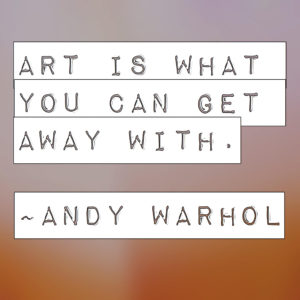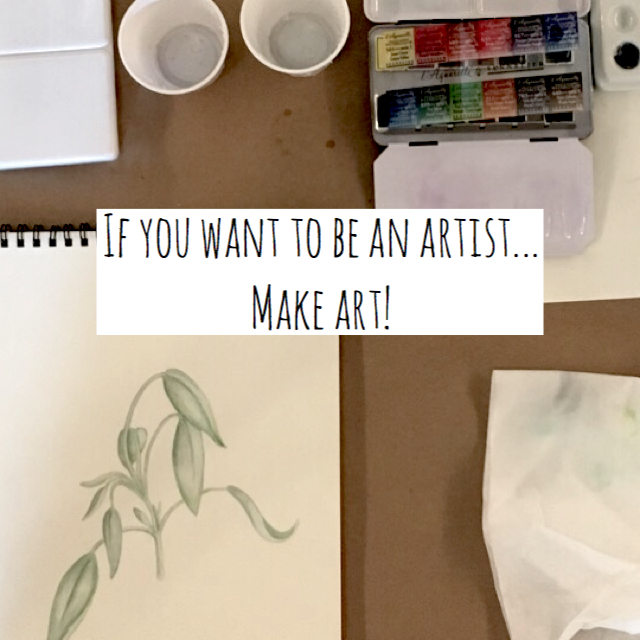 How would you define art?
How would you define art?
I had a teacher early on who told me I was not an artist, I would never be an artist, and I was wasting her time. Harsh! But… sound familiar? I have heard a surprising number of people recount similar stories.
I had another teacher who told a class full of incoming freshman that anyone can be an artist. It takes putting the work in and lots of trial and error, but anyone can do it. I bet you can guess which my favorite teacher was! Let’s just say I took at least one of her classes every semester of my college career.
So, what does make an artist? Vision? Creativity? Skill? Maybe it is having something important to say. Or simply the desire to create. I would argue that any one of these things could an artist make, though it doesn’t hurt to possess more than one. But I haven’t even mentioned the one that I believe is most important…
Practice, practice, practice!
We heard an interesting debate on Maine public radio while traversing the state after our trip to Baxter. It had to do with the “10,000-Hour Rule”. Heard of it? Here is the quick version…
Based on a 1993 study published by Anders Ericsson and made famous by Malcolm Gladwell’s 2008 book “Outliers”, the concept is that anyone can become an expert in anything by putting in 10,000 hours of practice.
The debate that we heard on the radio was the same one that you can read or hear over and over again if you google the 10,000-Hour Rule. Basically, that it is far too basic. It is grossly oversimplified in order to create a catchy buzzphrase and ignores details that are inconvenient to the overall point. For instance, the study was conducted on a group of violin students at a music academy in Berlin. It found that the most accomplished students had put in an average of 10,000 hours of practice by the time they were 20. An average. So… some more, some less. And they were in a music academy in Berlin, so you can argue they already had some innate ability that put them there.
You can argue a lot of things, and people do argue over this topic, a lot. I am a details person, so when I start to see holes in an argument, it makes it hard for me to get behind, but let’s take a step back and look at the big picture for a moment.
The original study cited deliberate practice, or practice that pushes you beyond your comfort zone. If you pushed yourself outside of your comfort zone and studied something with intent for 1 hour a day for over 27 years, do you think you would be pretty good at it? What about 3 hours a day, every single day of your life for just over 9 years? Actually, you might just get burned out on it, but it is a fair point. Practice doesn’t always make perfect, but it sure goes a long way.
The Talent Gene
Or…maybe you’re born with it? Using technology developed at University of Michigan, an international group of scientists believe they discovered an area of human DNA associated with talent and identified genetic variations that seemed to correspond to artistic abilities. Using the discovery, Shanghai Biochip Corporation developed a test which is being implemented at Chongqing Children’s Palace to predict in what areas a child might excel. Am I the only one creeped out right now? Children ranging in age from three to twelve have their saliva collected, DNA studied, and attend a 5-day camp where they are evaluated for what skills and talents they might be predisposed to.
Talent may very well be genetic. One person may be more apt to excel in a particular skill than another. Even the definition of talent itself presumes some “disposition” or “natural endowments”. But still, parents paying for an evaluation and summer camp for their budding genius are going to influence the outcome. If they are told Junior is inherently going to excel as a concert pianist, or is destined to be an Olympic gymnast, will they not put him or her in said classes? Will they not encourage practice, practice, practice? Did we establish that was, after all, the most important part? Except perhaps…
Desire
You can have all the talent in the world but it won’t amount to a hill of beans if you have no desire to put it to use. On the flip side, if there is something you want to do with all your heart, but you don’t know how, you will be motivated to learn, right?
Desire to learn or do something will fuel the motivation to practice, and will make you improve incrementally in your skills. Remember that the theory on practice refers to practice which pushes you outside your comfort zone. What can you do today that will push you to the next level. What extra challenge can you give yourself?
Art is what you can get away with.
I had to come back to this Warhol quote, because a lot of things get called art that might send your eyes rolling in their sockets. And a lot of people are too humble to call what they do art even when it is incredibly moving to the observer. It is between these two poles that I think all art exists.
This same encouraging teacher I mentioned earlier sparked a lively debate in class one day. What makes an artist? What made Andy Warhol an artist? Some of his most famous paintings were made assembly line style, aided by “workers” at the Factory, his studio and mecca for artistic types and eccentric personalities.
But still, we argued, he had the vision and the creativity behind it all, he was the artist. So, then what of Thomas Kincaid? You know, the mall kiosk artist with the cozy cabins and dreamy light? He has quite a following, and enjoys mass commercial success. I used to work in a mall, and one day his fans were streaming in excitedly going to get their Kincaid prints signed! I stopped one to ask, is Thomas Kincaid really here at the mall? No… one of his “artisans” was… who would sign the painting in proxy. When buying a Kincaid, you even have the option of upgrading to a “hand highlighted” print, where one of these artisans will paint some of the highlights with acrylic paints.
Now, love or hate, whichever camp you are in, and whichever art you prefer, are Warhol and Kincaid really that different? Are the Factory “workers” conceptually at odds with Kincaid’s “artisans”? It raised an interesting point and shifted my perspective on how I saw art. And it filled me with a desire to be an ambassador of a more inclusive art community, one that encourages artists of all walks of life and all skill levels and all genres. For one man’s Marilyn Monroe print is another man’s cottage in the woods. Who am I to judge?
So which is it?
I’d say the research is definitively indefinitive. But what have I experienced?
-I have talked to people who enjoy creating art but don’t because they think they’re not good enough.
-I have seen people who’ve never painted before try it only to find a talent they never knew they had.
-I have been in art classes with beginners who struggled at first, but who ended the semester with works that made my jaw drop.
If you want to be an artist, make art! If you want to be a painter, paint! If you want to be a writer, write! Create because it feels good. If you want to get better at it (and its okay if you don’t) then practice, or take a class. If you have the desire, and are willing to put in the time, you can accomplish anything you set your mind to. It may be an overused idiom, but it got to be that for a reason. It rings true time and again.
Take the next step
A great way to get started is to take a class! Check your local art school, community college, or university. Many offer community classes on nights and weekends. I can personally vouch for Watkins College of Art’s Community Education program in the Nashville area. You can also check your local art or craft store. I haven’t taken a class at Plaza Artist Materials (yet) but I have heard good things from people who have. If you are willing and able to travel, expand your search through Google or social media. This March I will be attending a watercolor retreat at Mount Hood outside of Portland, OR. Talk about a dream come true! I found out about it by following an artist I admire on Instagram.
Even if your town doesn’t have any art programs, and you are unable to travel, YouTube, Google, and your local library can always be counted on for plenty of how-to content.
…
There is so much more to say on this topic and I feel certain I will revisit it some day soon. For instance, what if you want to make art but you don’t feel you are a very creative person? How do you overcome fear of the blank canvas? What if you have a phobia of a certain medium or you just don’t think you have anything worthwhile to say? Well, I assure you, you do! And I am going to be working out how to encourage you over those humps and get you creating if you want to create. Because the world always needs more art.
What has been your experience with the arts? Are you a natural or do you struggle? Have you been afraid to try? And if so, have I encouraged you to throw caution to the wind and jump right in? We love to hear from you, please comment below!


Interesting observations; challenging questions. Alas, I suspect there are no definitive answers. Because, for starters, the ages-old brain-breaker question “What is Art?” cannot and never has been successfully answered. I’ve been actively involved in the fields of music, visual arts, and writing since I was a little girl. The more I know, the more I understand how impossible, and perhaps undesirable, it is to try and pin down answers about “Art” with a capital A. .But you know what? You’re right. It doesn’t matter. There’s no question that study and practice will perfect technique. If there’s a desire to express one’s self, following that path should bring an enormous sense of satisfaction as proficiency increases and joy even in the learning process. And that’s the bottom line. Joy doesn’t cost anything;it’s not fattening or illegal. It’s a fabulous.high. So go for it.
. .
Great points! The difficulty in defining art is why I have always been drawn to Warhol’s notion that art is what you can get away with. How can you define it? And maybe you’re right, attempts to do so are in vain and as you say, undesirable to do so anyway. Why try to pin it down? It is one area in our lives where we can be free from any conventions or rules! It’s another great point that you bring up- that joy is found in the learning process. Beginners can be encouraged to start because not only will their technique improve, but they will be rewarded with the joy of the process itself!